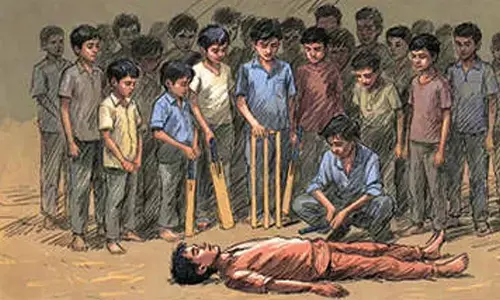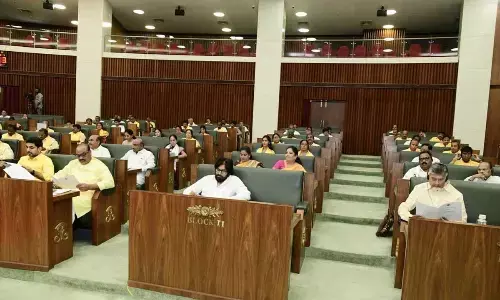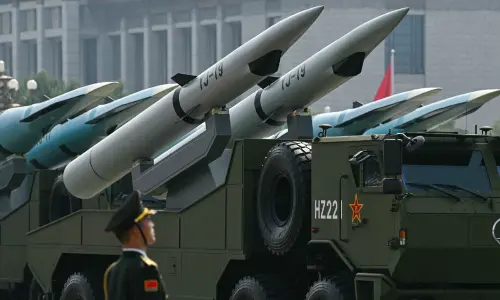Years ago, I visited Varanasi along with my wife to witness two great institutions. One: Lord Kasi Viswanath . The other a Bharat Ratna, Ustad Bismillah Khan. We prostrated before both with all reverence and dedication. I tried to introduce myself to Ustadji as the son-in-law of Padma Bhushan Pinakapani. But it did not ring a bell in his mind. Perhaps he had not heard about Pinakapani, for all I know. Perhaps his mind started filtering the earthy norms long back. The temple of Viswanath was at a stone’s throw away as the crow flies from his house. I asked him whether he visits the temple anytime.
“But I communicate with Him every day’’ was his reply. “But how?’’ He immediately started mumbling a raga in a creaky voice. “What is this raga?’’I enquired. “This is Bilawal”. Bilawal is the Hindustani version of Sankarabharanam! And when it was time for us to take leave, he apologetically enquired: “Your good name, please!’’. He must have tuned in a mechanism that filters anything except music into his blessed psyche.
I often wonder if God is not in the glorious creation of K.Asif’s “Mughal-e-Azam’’, in the great screen presence of Yousuf Khan (Dileep Kumar), the divine voice of Bade Ghulam Ali Khan and the heavenly melodies of Naushad, where can He be? The music, art, architecture, beauty and even the literary genius is devoid of its lion’s share if Muslim race is not there. How can anybody dare defy the great musical experience of Zubin Mehta’s memorable extravaganza for whatever political considerations! One editorial of a newspaper lamented that “If the relationship between politics and conflict tends to be linear, the interplay of culture and conflict is far more complex”.
.jpg)
Where the material understanding failed, perhaps the soul of a human being might find its answers for lasting peace and friendship. How can anybody disown patriotic fervor of Iqbal (Sare Jahan se acha, Hindustan Hamara),Talat Mahmud’s ghazals, Mirza Ghalib’s poetry, Umer Khayyam’s Sufi philosophy, Mehdi Hasan’s mellifluous melodies, Ghulam Ali’s musical treats, Allauddin Khan’s Dadra, Begum Akhtar’s Thumri, the grace and elegance of Nargis and so on and so forth?
Humility and dignity and sense of reason go with music, if one may say so. Music vacates the darkest corners of the human heart, cleanses the mind, fills the spaces hitherto untouched with feeling and harmony. I cannot forget an experience which made my eyes wet one evening. We invited the world famous maestro, Padma Vibhushan Amjad Ali Khan whose name spells ‘sarod’ for our Gollapudi Srinivas Memorial Foundation’s National Award function. I was overwhelmed with emotion seeing him getting down the car and immediately rushed forward to touch his feet. He did something unthinkable. He instantly bowed and did the same trying to touch mine What humility! Music makes one humble and self-effacing.
It is a rare opportunity and a great tribute to the taste of the audiences of Kashmir Valley that the German Embassy chose to hold a musical extravaganza of Bavarian Philharmonic Orchestra conducted by the World famous maestro Zubin Mehta called Ehsaas-e-Kashmir. It evoked great response among stalwarts like Farook Nazki, Bhajan Sopori and others while the separatists find this highly objectionable as they think that this is a diversionary tactic of the establishment from the turmoil of the region during the last few decades. I worked in All India Radio for 20 years and we heard the great contributions of composers like Nazki, a Carl Duisberg Fellow, who encouraged several artists and icons from Digambar Paluskar to Ravi Shankar. This is only to authenticate the better taste of the valley. There are any number of music luminaries in the valley who eagerly waited for the memorable experience.
Similar protest erupted when the maestro conducted Richard Wagner’s Tristan and Isolde in 1981 at Tel Aviv, Israel, because of a very narrow and parochial point of view of the audience that day that the German composer was anti-Semitic in his outlook and that Nazis applauded him for that reason. It is unfortunately setting wrong standards to an otherwise universal language called ‘music’. Kashmir is known for its resilience of spirit and also its cultural values, which stand untarnished in spite of the political turmoil all these years.
The concert on 7th September at Shalimar Bagh in the foothills of Zabarvan overlooking Dal Lake had a different transaction to conduct among the souls of the audiences – not at their mind level, in trying to find a language of peace and plenty. And the fact is that the human spirit operates on a different plane to unite the world’s millions in yet another medium called music.
German Ambassador to India Michael Steiner has rightly put it when he said that the distance between his country and Kashmir is around 7750 miles and when the music erupted in the valley, it was reduced to zero. The 77-year-old maestro has said that at last his dream of playing his music has been fulfilled in the valley. The parallel show held by the secessionists ‘Haqeeqat-e-Kashmir’(Reality of Kashmir) was held despite hurdles.
Zubin Mehta succinctly said that “I didn’t choose Kashmir, but it chose me’’. He said that music is the only language to spread the message of peace. The 105-minute concert to the packed house of 2000 guests on that day has done precisely that. Zubin Mehta made a wonderful fusion of the traditional Kashmiri instruments with Abhay Sopori’s troupe and the Bavarian orchestra. It was a memorable integration of tradition and classical music by one of the rarest conductors of the world.

.jpg)








